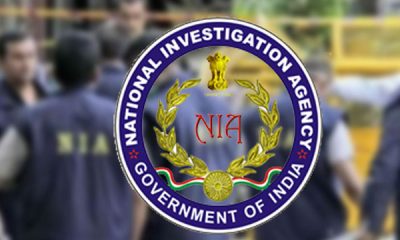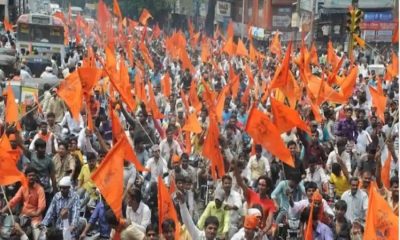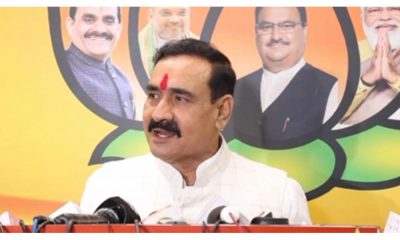Crime
Migration Mess: No jobs in hand amid food crisis, Madhya Pradesh’s Khandwa witnesses tribal exodus
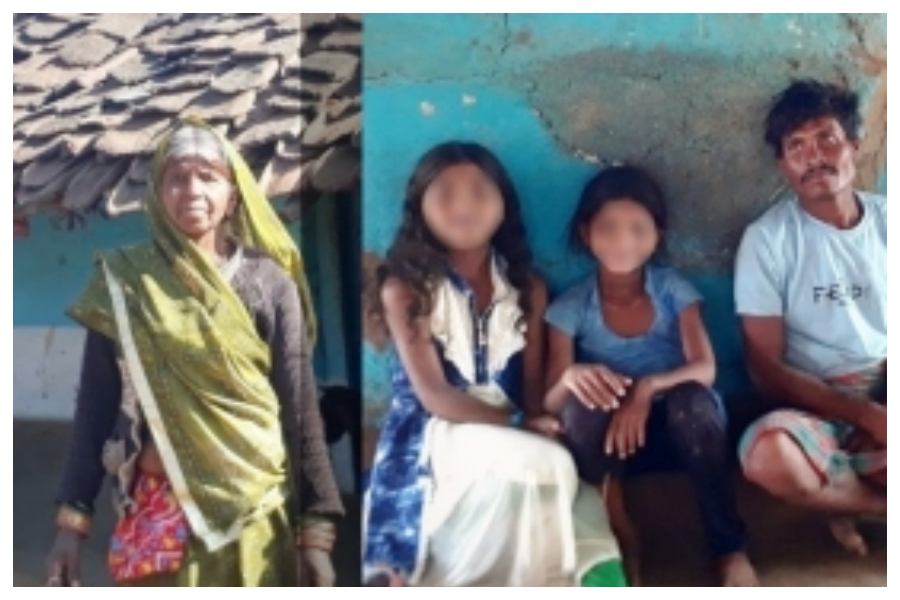
Adivasis from the region move to other states for employment, only to find themselves worked to the bone, living in grim conditions and often cheated of their wages or held hostage by employers.
“I have a wife and five daughters, but there’s no work in the village. Even if you find some, the panchayat takes months to pay us,” said 35-year-old Poonamchand Sitaram Gautam, a resident of Khandwa district in Madhya Pradesh, who recently returned from Koratala in Telangana, where he was employed as a construction worker.
“Under the Public Distribution System, we receive just 5 kg of foodgrains for each member of the family every month. But these rations barely last a fortnight,” he added, alluding to the food crisis in his tribal-dominated village of Dabhia in the state’s Khalwa region.
Based on a field study conducted in 12 states by Ekta Parishad, Madhya Pradesh is purported to have the highest inter-state migration rate — standing at 32.39 per cent, Khandwa being one of the districts leading. According to estimates by a local body, between 5,000 and 10,000 tribals migrate out of Khalwa every year to work as labourers in other states.
Khalwa is spread over 70 to 100 km from the district headquarters. While many villages of this block are part of the Khandwa-Betul State Highway, most of Khalwa falls under the jurisdiction of the forest department, with 90 per cent of the population living in remote areas. In fact, when 101Reporters visited Dabhia, we found that at least two members from each house had migrated to other states for work.
Last year, Gautam’s 16-year-old daughter Garima found work as a labourer to build drains under the Mahatma Gandhi National Rural Employment Guarantee Act (MGNREGA). After working eight hours a day for five weeks, Garima was paid only two weeks’ worth of wages. When her mother Rajni Bai questioned the panchayat, she was told that the money had been transferred to her account, but they have yet to receive it.
Jamna Kallu Chauhan, too, shared her woes. “In the last two weeks, I carried out digging work for the panchayat eight hours a day. But I was paid only for one week. I approached the panchayat office in Semliya repeatedly, but no one cooperated with me,” the 60-year-old said.
The sarpanch of Semliya panchayat Pyari Bai Ramesh Takher, however, denied any outstanding payments.
“No labourer’s wages are outstanding with the panchayat,” she claimed. “The money has been transferred into their accounts. The villagers often withdraw money and blame us later.”
No logic to the numbers
Kishore Kumar Uike, the CEO of Janpad panchayat, insisted that the district is continually opening up job opportunities for the area’s local residents.
“Janpad panchayat has created employment for 17,000 labourers in the development block,” he said. “I don’t understand why people are migrating for work. Even today, if anyone approaches us for work through the panchayat or district, we will provide them with work.”
According to the MGNREGA website, which currently seems inaccessible, 3,821 days of wages were generated in Khalwa from May 2020 to May 2021, benefiting 644 workers. The work given to labourers included pond construction, canal deepening and dam checks. The website has had no updates since then.
A hunger-induced distress migration
According to Prakash Michael, treasurer of the Spandan Samajseva Samiti, an organisation working to provide nutrition and employment to these tribals, the primary cause for migration is the food crisis in the region, which has increased in the last couple of decades.
“Adivasis have ditched growing traditional crops and turned to cash crops such as soybean. Bajra and other millets such as koda and kutki, once the backbone of their nutrition, are no longer visible in the fields. They use most of the money they earn by selling produce to repay loans. They are left with very little foodgrains, so this is basically hunger-induced distress migration,” Michael told 101Reporters.
This explanation holds true for 60-year-old Jamna, who now lives alone in her hut. Her husband, Kallu Chauhan, had “taken up a contractual job of harvesting moong in Nahali, Harda district, despite being terribly ill. The family’s financial crisis had pushed him to move, and within three days, we lost him to the illness.”
One lakh labourers migrate from Nimar
While the administration has no official figures to share, Spandan Samajseva Samiti, which collects data for land surveys, estimates that around 1 lakh people from Khandwa, Khargone, Barwani and Burhanpur of Nimar district migrate to Maharashtra, Telangana, Karnataka, Goa and Andhra Pradesh each year.
However, this large workforce is unorganised and unprotected. These labourers are neither insured by their employers, nor are they provided safety equipment for use while working. This often leads to their death, and since there are no official records of migrant labourers, employers shirk their responsibilities by deeming them mere accidents.
Under the Inter-State Migrant Workmen Act, the employer must provide migrant workers with food, lodging, healthcare and social activities. Labour officials must be kept in the loop to ensure that workers’ rights are not violated. Also, the figures of migrant workers must be displayed on the Migrant Labourer Portal, though no data appears to track this information.
District Labour Officer S.S. Alawa explained that the act “can be invoked only if the contractors or residents officially inform the department about their migration, which the tribals here fail to do. Hence, they cannot exercise any rights under this law”.
Wily contractors, callous employers
Furthermore, contractors here deploy locals to connect them with labourers. These people take advantage of their knowledge of the Korku dialect and lure the tribals by promising large sums of money as wages. They are often paid an advance so they believe it’s a good deal and manage to convince their friends and neighbours, too.
On the appointed day, the contractor’s vehicle arrives at the village to transport the migrants. The journey usually takes place at night, so the workers don’t recognise where they are being taken. They often don’t find out for days and weeks which village, district or state they are working in. The contractor shares his mobile number to placate the families, but the phone is often turned off once they set out with the migrant labourers.
Daji Lofa, a 30-year-old who returned from harvesting sugarcane in Maharashtra, recalls a contractor who had come to the village before Diwali last year and promised everyone cane-cutting work for three months. He had also promised them huge amounts of money, which would enable them to stay home without working for the rest of the year. He had paid an advance of Rs 7,000 to one of the workers. A week after Diwali, the contractor arrived at 11 pm with two mini Eichers and took 40 people with him. But they were refused pay after putting in hours of hard labour.
Such are the kinds of experiences that the tribals of Khandwa attempt to flee.
Babu Mangal, one of the workers from Khalwa held hostage in Pandharpur, Maharashtra, last year, said they were treated worse than animals. He, along with his wife, had to continue harvesting sugarcane despite being terribly ill.
“We didn’t get any treatment when we were ill. We had to arrange for our own food and sleep in the open fields or inside warehouses,” the 50-year-old told 101Reporters.
Similarly, when Sunita Kajle from Langoti village went to Maharashtra to work, she found out she was pregnant. But she was still forced to continue working long hours without relief or proper nutrition until the sixth month of her pregnancy. As a result, she gave birth to a malnourished daughter after returning.
In some cases, the tribals bear the consequences of this survival act — the migration — longer than they could have anticipated, at times for life.
Take Munni Bai, for instance. She injured herself while working at a brick kiln and continues to live with it. She had dropped bricks on her feet, which initially caused swelling and later became worse. Munni can no longer work due to her injured leg and has received no compensation from neither the contractor nor the government.
Socio-economic factors
Khandwa district has a population of 13,10,061, of which 80.20 per cent live in villages. The literacy rate of Khalwa is only 43.10 per cent (51 per cent among males and 34 per cent among females). Despite this, the proportion of labour in Khalwa is 17.38 per cent, of which 9.66 per cent is male and 7.72 per cent female. Agriculture is the primary source of income, but the people here barely own any land, 2 acres per family on an average.
The percentage of total agricultural farmers in the tehsil is 14.08 per cent in Khalwa, of which 9.88 per cent are male and 4.20 per cent are female. There’s no focus on employment-oriented education, and the entire sector is dependent on resources from agriculture and forests.
In 2009-2010, the state government had created natural resource-related jobs in Awliya under the Small Forest Produce Association, for the manufacture of incense sticks, perfumes, bamboo furniture and household items. Initially, over a 100 people were employed under this scheme, but they could not grow beyond making incense sticks, which wasn’t financially viable and hence, discontinued.
Crime
Woman tourist harassment case: Two Kerala cops suspended, two taxi drivers arrested (Lead)

Thiruvananthapuram, Nov 3: In a swift action following the viral video of a woman tourist being harassed by local taxi drivers in Munnar, the Kerala Police, on Monday, have suspended two officials and taken two taxi drivers — identified as Vinayakan and Vijayakumar — into custody.
The case has sparked widespread outrage on social media, prompting the state government to promise corrective steps to ensure tourist safety in the hill station.
The video, originally posted by Janvi, a Mumbai-based assistant professor, showed a group of taxi drivers confronting and intimidating her and her friends for booking an online cab instead of a local taxi near the KSRTC bus stand in Munnar on October 30.
The drivers, reportedly opposed to app-based taxi services, allegedly warned the tourists that they would not be allowed to travel unless they hired local taxis.
Janvi alleged that when she approached the police for help, officers failed to act, echoing the stance of the taxi union.
“We were forced to take another vehicle and eventually cut short our trip out of fear,” she said in the video, which has since been deleted but had already gone viral.
Following the public outcry, the Munnar police registered a suo motu case under Sections 126(2), 351(2), and 3(5) of the Bharatiya Nyaya Sanhita, relating to wrongful restraint and criminal intimidation.
The FIR did not initially name any accused, but police have since identified three taxi drivers, two of whom are in custody, with the third expected to be taken into custody soon.
State Tourism Minister P.A. Mohammed Riyas called the incident “unfortunate” and said it “should never have happened,” adding that steps will be taken to strengthen police vigilance and prevent the harassment of tourists in the future.
The incident has reignited debate over the monopoly of local taxi unions in tourist destinations and the challenges faced by app-based cab services in Kerala.
Crime
Thane Municipal Corporation Launches Fresh Demolition Of Illegal Structures In Mumbra, Residents Protest
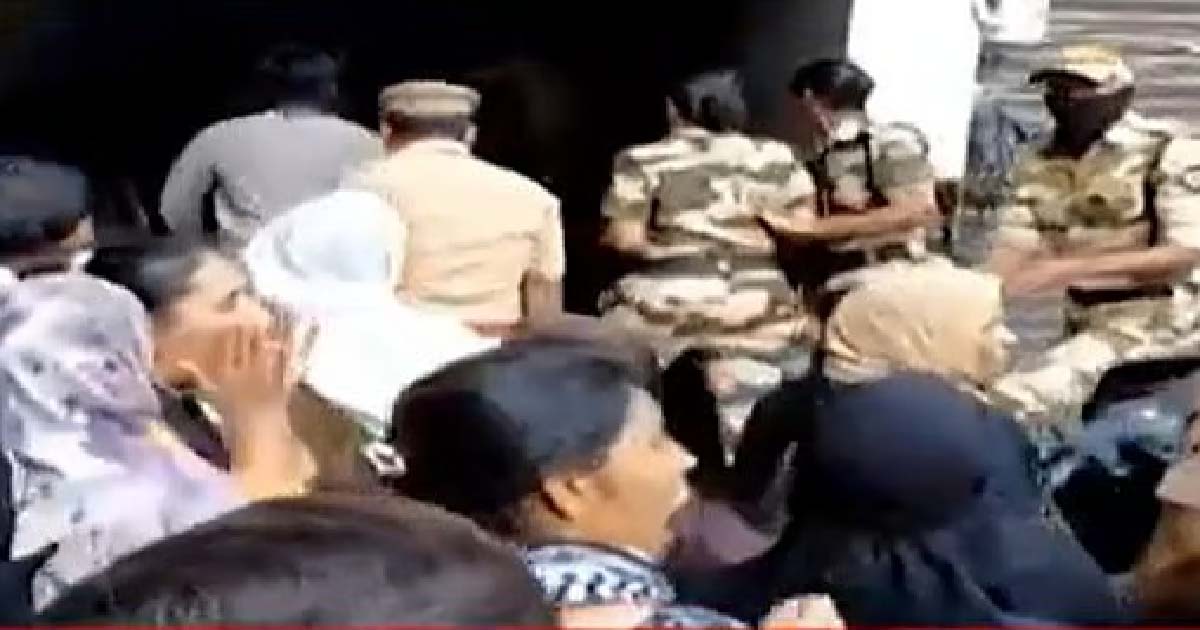
Mumbai: The Thane Municipal Corporation (TMC) has resumed its demolition drive against illegal constructions in the Khan Compound area of Mumbra, Maharashtra. Just days after 17 unauthorised buildings were razed, civic officials have now turned their attention to more illegal structures in the nearby Shil Daighar locality.
This renewed action has once again stirred tension in the area, with hundreds of residents gathering to oppose the demolitions.
Fearing unrest, the Thane Police and the State Reserve Police Force (SRPF) have been stationed at the site. The presence of uniformed personnel and demolition machinery has created a charged atmosphere in the locality.
The action is being carried out under the directives of the Bombay High Court, which ordered the removal of unauthorised constructions built without proper permissions or safety clearances.
The Bombay High Court had earlier directed the Thane Municipal Corporation to take strict action against illegal structures in and around Mumbra. The civic body had previously demolished several such buildings but had paused operations after widespread protests from local residents.
Despite multiple notices and warnings, the unauthorised structures continued to expand, prompting the latest round of demolitions.
Civic officials indicated that the demolition drive will continue in phases until all unauthorised constructions identified in the High Court order are cleared. The Thane Municipal Corporation has also urged citizens to verify property documents before purchasing any new homes.
While authorities maintain that the action is lawful, the human cost of the demolition has once again highlighted the growing tension between development enforcement and urban housing distress in Mumbra.
Crime
Ten militants of different outfits arrested in Manipur, arms recovered

Imphal, Nov 3: Ten extremists of two different banned outfits were arrested by security forces from three separate Manipur districts during the past 24 hours, and some arms and ammunition were recovered from them, officials said on Monday.
A police official said that the arrested militants belonging to different extremist groups — the Kangleipak Communist Party (KCP) and United National Liberation Front (UNLF) — were arrested from Kakching, Thoubal and Imphal West district.
Arms and ammunition were recovered from the arrested militants. The arms include one .303 rifle with a magazine, three single-barreled bore rifles, three shotguns, two 9 mm pistols, and the ammunition included three powerful grenades, five detonators.
Many incriminating documents were also recovered from their custody.
The security forces also destroyed illegal poppy plantations cultivated over a total of 30 acres in the Kangchup areas under the Kangpokpi district.
Three farm huts, three fertiliser bags and two sacks of salt found at the sites were destroyed.
Two burnt Gypsy vehicles were also found at the site.
With the fresh arrest of ten militants, the security forces have arrested 18 extremists of different banned outfits in Manipur during the past 48 hours.
An official said that the hardcore militants were involved in various crimes, including intimidation, forcible collection of subscriptions from people, government employees, contractors and others.
The Manipur Police official said that the security forces continue to conduct a crackdown against the militants, and search operations and area domination are being carried out in the fringe, mixed-populated and vulnerable areas across districts.
According to the official, a total of 115 nakas/checkpoints were installed in different districts of Manipur, both in the hills and the valley region, to prevent untoward and illegal movements of inimical elements and suspected vehicles.
He said that the security forces have provided escorts to many vehicles carrying essential items along the Imphal-Jiribam National Highway (NH-37). Strict security measures have been taken in all vulnerable locations, and a security convoy is provided in sensitive stretches to ensure free and safe movement of vehicles.
Manipur Police have urged people not to believe rumours and be vigilant of false videos. “The veracity of any circulation of unfounded videos, audio clips, etc., may be confirmed from the Central Control Room. Moreover, there are possibilities of many fake posts being circulated on social media. It is hereby cautioned that uploading and circulation of such fake posts on social media will attract legal action with consequences,” a police statement said.
The police authority also appealed to the concerned people to return the looted arms, ammunition and explosives to the police or the nearest security forces post immediately.
-

 Crime3 years ago
Crime3 years agoClass 10 student jumps to death in Jaipur
-

 Maharashtra1 year ago
Maharashtra1 year agoMumbai Local Train Update: Central Railway’s New Timetable Comes Into Effect; Check Full List Of Revised Timings & Stations
-

 Maharashtra1 year ago
Maharashtra1 year agoMumbai To Go Toll-Free Tonight! Maharashtra Govt Announces Complete Toll Waiver For Light Motor Vehicles At All 5 Entry Points Of City
-

 Maharashtra1 year ago
Maharashtra1 year agoFalse photo of Imtiaz Jaleel’s rally, exposing the fooling conspiracy
-

 National News1 year ago
National News1 year agoMinistry of Railways rolls out Special Drive 4.0 with focus on digitisation, cleanliness, inclusiveness and grievance redressal
-

 Maharashtra12 months ago
Maharashtra12 months agoMaharashtra Elections 2024: Mumbai Metro & BEST Services Extended Till Midnight On Voting Day
-

 National News1 year ago
National News1 year agoJ&K: 4 Jawans Killed, 28 Injured After Bus Carrying BSF Personnel For Poll Duty Falls Into Gorge In Budgam; Terrifying Visuals Surface
-

 Crime1 year ago
Crime1 year agoBaba Siddique Murder: Mumbai Police Unable To Get Lawrence Bishnoi Custody Due To Home Ministry Order, Says Report



